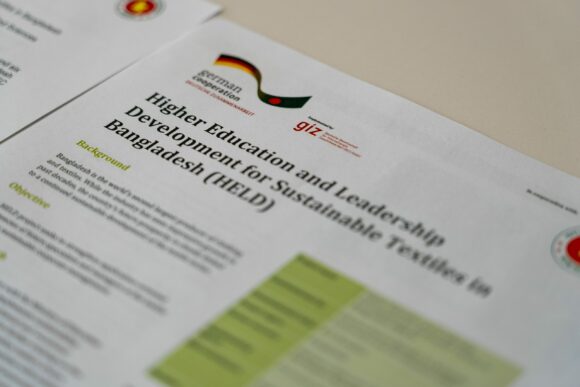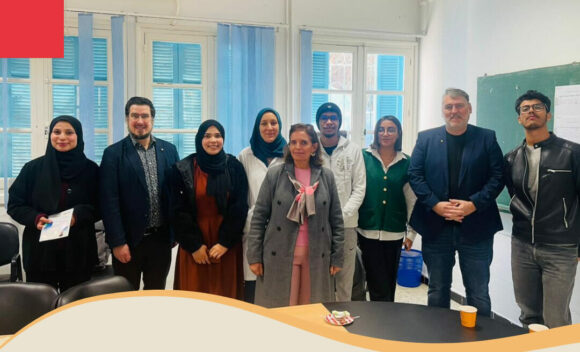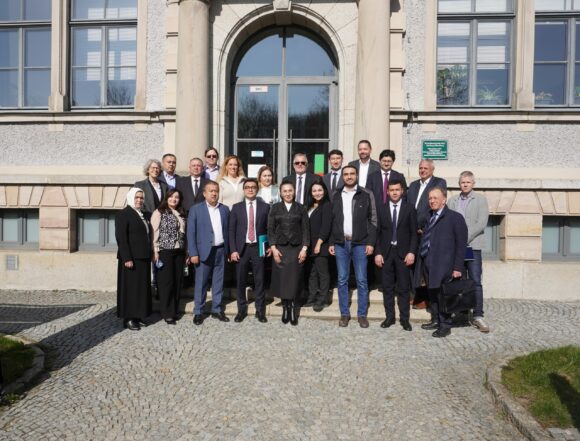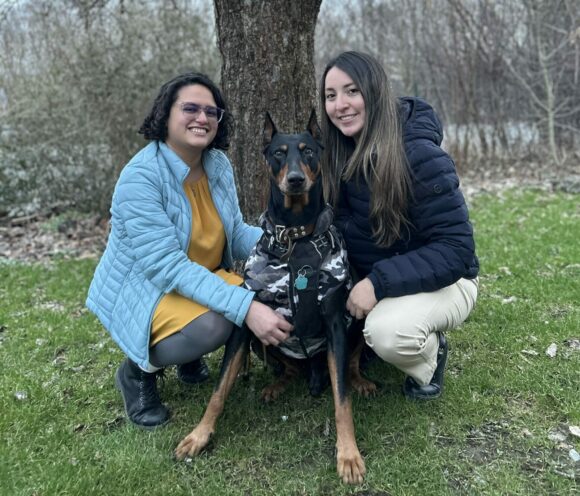The encounter with other cultures is not only of great importance from a professional perspective, it also provides new experiences and promotes the development of one’s own personality. In order for an encounter to become a positive experience for both sides, it helps to deal with the respective other culture. At Hof University of Applied Sciences, the Faculty of Engineering, among others, offers the module “Intercultural Competence”, which is carried out by the Career Service and by lecturers of the faculty.
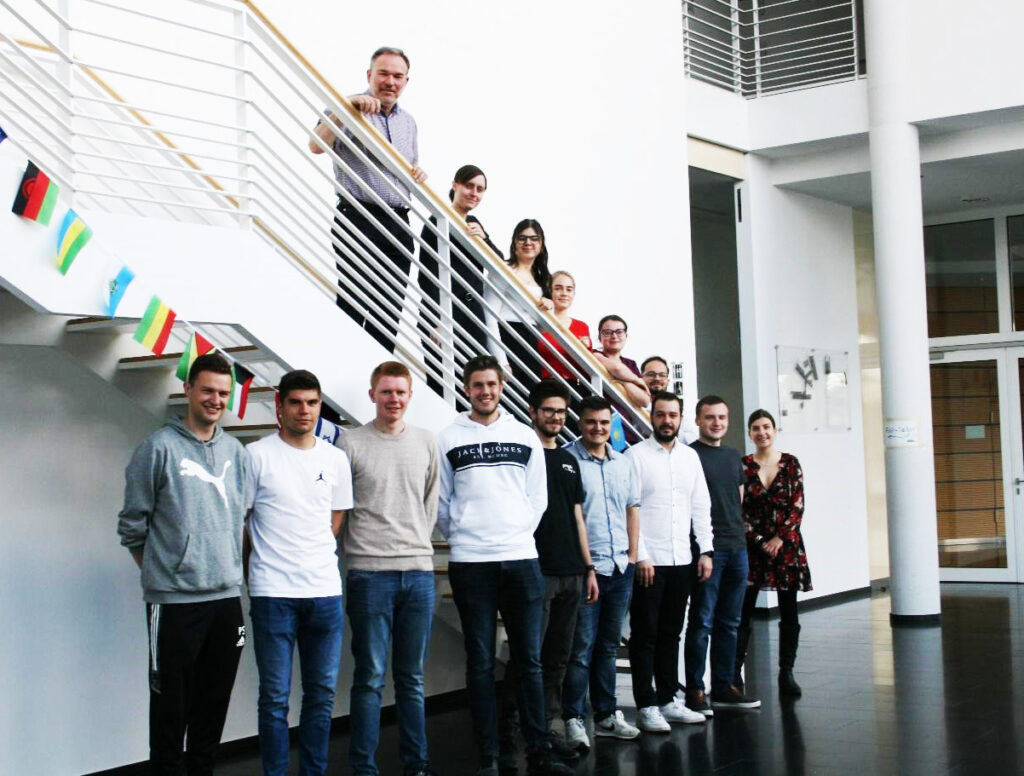
In these courses, students learn not only facts about different countries, but primarily basics such as country-specific ways of thinking and behaving, food cultures or different forms of communication. This basic knowledge is a first and important step in getting to know and understand other cultures. But only the encounter with people from another culture makes existing differences as well as commonalities visible. The personal encounter with “the other” conveys the diversity that people carry within themselves and transforms prejudices into experiences, thus also enabling the development of an understanding for another culture.
The module participants from the Environmental Engineering course were given the opportunity of personal encounters with people of different origins in the summer semester of 2022. In order to deepen the theoretical knowledge they had acquired so far, they conducted in-depth interviews with five people from China, Colombia, Croatia, USA/Scotland and Ukraine, who have been living and working in Germany for several years. In the process, they not only learned a great deal about the respective country and its people, but also encountered personalities with very different perspectives on Germany and on the importance of intercultural competence. For reasons of personal privacy, the names of the people interviewed cannot be disclosed.
From a big Chinese city to the German province
Anna-Lena Seit, Tina Schörner and Mehmet Yücel interviewed a 33-year-old woman from China. She studied civil and environmental engineering and has been working as a product and project engineer for a medium-sized water management company for several years.
In preparation for the interview, we had already learned about various cultural characteristics of China, such as its special script, its historical art treasures, or its special public spirit and strong striving for harmony. Through the interview, we were able to expand our knowledge about this culture once again and prepare ourselves for a future visit to China in the best possible way.”
Anna-Lena Seit, Tina Schörner, Mehmet Yücel
As an example of the diversity of Chinese culture, the interviewee described the varied, colorful style of dress, while noting that muted colors are more preferred in Germany. Another difference mentioned was the direct speech in Germany. Chinese tend to strive for harmony and have a very friendly and indirect way of expressing themselves because of this. German culture is also interesting to the interviewee, such as the German brewing culture, which is known worldwide
I try to try a regional beer everywhere!”
Chinese student
The impression of the interview motivated the group participants to recommend visiting China once mainly because of the cultural differences between China and Germany. Their most important tip for a visit to China is: “Never put the chopsticks vertically into the food. This means that the food will not taste good and this is an absolute no-go!”
From Colombia to Stuttgart to Hof
Oguzhen Günes, Fabian Urban and Paul Schratt interviewed a young Colombian woman, 28 years old and from the northeast of Colombia. She studied environmental engineering and works as a research assistant at a Bavarian university.
“During our research, we found that the Colombian population has a very high diversity due to its history. Basically, there are three ethnic origins: the group of indigenous peoples, the European colonists, mostly from Spain, and slaves of African origin. Therefore, we were already eager to talk to our Colombian interviewee. She came to our interview appointment on time, although she herself says that Colombians are usually unpunctual, but this is not considered a negative thing in Colombia. Besides many cultural differences, but also similarities between Germany and Colombia, we were able to learn a lot about her, her background and intercultural communication.”
Oguzhen Günes, Fabian Urban, Paul Schratt
The first time in Germany was not easy for the interviewee, as she came to Germany without any language skills. However, she was able to overcome this hurdle easily due to her open and friendly nature and gradually learned the German language and how to deal with the German bureaucracy. The interview yielded three main insights:
– In communication, especially in intercultural communication, an open and respectful approach to the other person is essential.
– A certain willingness to take risks, to jump over one’s shadow and to communicate openly is of great advantage.
– The English language offers a good opportunity to communicate interculturally. However, for even better communication, it is an advantage to learn the respective national language.
“Although I come from Colombia, I find the colder weather in Germany very pleasant, especially the winter – I had enough heat and sun in Colombia!”
Research assistant from Colombia
USA, Scotland or Germany? Intercultural diversity combined in one person
Philipp Tissarek, Daniel Schmidt and Lea-Carina Schmidt interviewed a real globetrotter: born in the USA, raised in Austria, France and Scotland, citizenship German/British. The 42-year-old is Manager for International Business Development at a technology company. He has lived in a wide variety of countries around the world and speaks 5 languages fluently.
“We were very impressed by his life journey & experiences.”
Philipp Tissarek, Daniel Schmidt, Lea-Carina Schmidt
The start in Germany was relatively easy for him due to the inputs received in childhood from his mother. However, this was not the case everywhere. He reported that the step to China was much harder, especially due to language barriers and a different social behavior of the population compared to his own western socialization. Through his experiences, he has learned how important it is to be open to other cultures at home as well as abroad. He places special emphasis on communication, adaptation & respect
“Where I lay my head is home!”
The interviewee quoted Metallica as a definition for his sense of home
When communicating with other cultures, intelligibility & mutual accommodation is essential. The interviewee has learned through his intercultural exchange that prejudices and clichés are usually not true.
Through many international experiences and his German-Scottish roots, he now feels like a European. He came to this realization in particular through Brexit as well as global problems such as climate change, which he believes can only be solved through international unity and cooperation. In particular, he speaks out against the division of society and instead for more community.
For a safe life from Ukraine to Bavaria
Sarah Schreiber, Celine Schaa and Selime Sayar interviewed a 49-year-old PhD researcher from Ukraine who has been working as a research assistant at a Bavarian university since 2020.
“Often superstitious, always hospitable, materialistic and rather indirect, that’s how the Ukrainian stereotype is described. But is this description really accurate? Together with her, we were able to gain the following insights: on the one hand, she confirmed to us that these characteristics are indeed traits that can be found in many Ukrainians. On the other hand, she showed us what influence their stay in Germany has on their behavior and views.”
Sarah Schreiber, Celine Schaa, Selime Sayar
Historically, superstition is part of the behavior of Ukrainians. Very often unconscious and habitual. Ambition and diligence are other prominent traits of Ukrainians:inside, which result from the financial insecurity and high inflation rate in Ukraine. Therefore, more emphasis is placed on the economic/external success of the person, and personal matters recede somewhat into the background in conversation. The high value placed on material things can also be attributed to this.
People are generally very hospitable and friendly, but sometimes suspicious and wary of strangers. In addition, in their opinion, it is essential both to show the necessary respect to the elderly and generally to treat all foreign cultures as equals. Adapting to the behavior of people in other countries should be a matter of course as a guest and also requires a certain respect for the culture
“In Germany, the person himself is the most important thing. In Ukraine, things come first. This means that the person’s success, their success in their job and how far they can take it, is a priority. Since I’ve been living and working here, also thanks to my new colleagues, the importance of personality has become more important to me than material possessions.”
Ukrainian scientist
Born and lived in Germany as a child, now at home in Croatia
Nils Winkler, Christopher Funk and Simon Fraas interviewed a German-born Croatian, 46 years old, trained in mechanical and electrical engineering and working for a municipal wastewater disposal operator
Croatia is known as the land of a thousand islands, of cevapcici and for good weather – these are the first impressions that pop into your head when you think of Croatia.
“In our interview we were able to get a deeper insight into Croatian culture and its facets. During the conversation, under interviewee mainly went into the cultural differences and similarities between Germans and Croats, which he can describe particularly well from the perspective of a Croatian born in Germany.”
Nils Winkler, Christopher Funk, Simon Fraas
For the most part, the interviewee named differences in professional life: in Croatia, it is common to change professions several times in the course of one’s working life and across different industries, whereas Germans usually stay in the same professional field. He also spoke about social life in Croatia. It turned out that Croatians are much more sociable and flexible in dealing with friends and family. For example, people meet regularly with friends in a café.
The world has become a small village.”
Croatian interviewee
Despite the listed cultural differences, he has come to the conclusion that due to globalization and our networked society, cultural boundaries are gradually merging. This phenomenon is more prevalent among the younger generation, whereas the older generation leads a more conservative lifestyle due to historical experiences.
Uniform knowledge from cultural diversity?
First the theory, then the practice in contact with interesting people. What are the insights of the module participants? There was much and intensive discussion about this. The following table shows the most important insights from an exciting module with enormous engagement of the participants.
Commonalities among the interviewees
- Adapting to foreign cultures on site is important, especially in the business environment.
- Cultural experiences are not taken for granted – interviewees recommend being considerate of others.
- Knowing the history of a country is important to understanding the other culture.
- Different cultural perceptions between generations can be observed in all countries. All interviewees emphasized respect for other cultures.
- All interviewees see sufficient knowledge of the local language as very important when living in another country.
- All interviewees emphasized the difficulty of learning the German language.
Differences among interviewees
- Nations have different values: In Ukraine, material things are rated more important than in Germany. In Croatia, there is a more flexible relationship to occupation or career choice. According to the definition of a happy life in Asia, the community is more important than the individual.
- In Germany, very direct communication is preferred, while in Colombia, Ukraine, China and Croatia it is more indirect.
- In Germany, there are better working conditions and career opportunities than in most countries.
- In Germany, there is a stronger separation of work and private life; this is not as pronounced in the countries of the interviewees. Accordingly, personal interactions may differ.
- The clearest differences were found in the description of the various food cultures. The example of Ukraine showed that superstition has a different significance in other cultures than in Germany
- Different topics in conversations even small talk
- Different leisure time cultures
- Different status symbols
- Dealing with punctuality is not the same in all countries, there are significant differences to Germany.
Even though some of the statements of the interviewed persons can be found in the extensive literature on intercultural competence, the module participants emphasized the value of the personal conversation. It makes a considerable difference whether information about other cultures is read up on or underpinned with personal experiences and perspectives.
What do the module participants take away as the most important aspects of intercultural competence? Here are the top 5:
- Openness to the other culture
- Willingness and a certain risk to get to know the other one
- Respect and appreciation
- Adaptation to foreign cultures
- Learning the language in order to overcome language barriers
In a joint dialogue with people from another culture, many more similarities than differences are revealed. It plays a significant role whether the people meeting already have a common context, for example, come from a common professional discipline, share a hobby with each other or have special values. In their encounters with five very different people from very different cultures, the module participants experienced intercultural competence first-hand. The personal encounter with people makes other cultures tangible and thus understandable.




